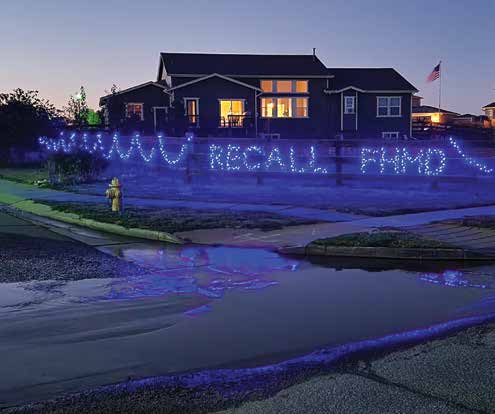Residents of Falcon Highlands Filing 1 have formed a coalition of people to address water issues that have wreaked havoc with their individual homes since springtime. Flooded basements and groundwater seepage from possible drainage system issues are at the center of their concerns.

They need a fix for the situation, and as of this date, the Falcon Highlands metro district is not claiming responsibility for the underdrain system and the county says it’s not their responsibility.
Cristina Welch, Filing 1 resident, has thus far headed up the “coalition” and has conducted two meetings to address their options, which include a board recall election.
On Sept. 9, more than 80 people attended a homeowners’ meeting for residents of Falcon Highlands. On Oct. 9, homeowners attended a Falcon Highlands Metropolitan District board meeting.
The following information includes excerpts from the minutes of the two meetings, recorded by Cristina Welch.
At the Sept. 9 FHMD board meeting, the board listened to comments from residents regarding the groundwater issue, but no action was taken. During the meeting, the board went into two executive sessions during the meeting, which created a large time lapse for the residents who attended, according to the minutes of the meeting.
This meeting led to exchanges on Facebook a couple of days later. On Sept. 11, Welch posted her disappointment at the low key reaction of FHMD board members toward residents’ complaints at the board meeting.
Tonia Joyner, president of the board, responded by stating that homeowners were heard and the board was trying to find a solution but it would take time.
Welch posted again on Sept. 13 stating that immediate action needed to be taken to resolve the issue.
A second homeowners’ meeting was held Oct. 7. More than 55 people attended.
One of the speakers was Dave Doran, president of the Upper Black Squirrel Creek Water Management District, the taxpayer-supported organization responsible for adopting the rules and regulations dealing with the use, control, conservation and protection of both the quality and quantity of groundwater in the area. He said that when Falcon Highlands was being developed, Upper Black Squirrel advised against building basements in the area due to high groundwater. However, the developers won out and basements were built. He said the subdivision’s water supply comes from nonrenewable aquifers.
Doran expressed concern that building more homes in Falcon Highlands Filing 3 would add to the problem. He said Upper Black Squirrel is on the community’s side and wants to help resolve the issue.
A second homeowners’ meeting was held Oct 7. More than 55 people attended. A Concerned Homeowners’ Committee was formed, not to establish an HOA, but to address major issues like road conditions, property taxes and water issues.
The meeting focused on the groundwater/drainage issues such as the lack of response from the county and the metro district and recall election options.
Charles Wolfersberger of Wolfersberger LLC, a metro district management company for metro districts that have homeowner controlled boards, spoke at the meeting
Wolfersberger brought out these points: Colorado and Florida are the only states in the country that allow corporations to form property tax districts. He said California did away with the practice because it is a conflict of interest when developers who are not elected by taxpayers sit on boards and receive taxpayers dollars.
Wolfersberger brought out the following points: Colorado and Florida are the only states in the country that allow corporations to form property tax districts. He said California did away with the practice because it is a conflict of interest when developers who are not elected by taxpayers sit on boards and receive taxpayers dollars.
He said homeowners who control the district have a unified voice and can make it work for them.
Metro districts are formed by court order, funded by homeowners’ taxes and elect board members who fund infrastructure and manage things like parks and open spaces, Wolfersberger said.
Two board members, Erin Ganaway and Leo Schumacher, are representatives from Challenger Homes, which creates a conflict of interest, he said.
He also made the assertion that if a board is not responsive to homeowners, it could be because of too much developer influence.
Wolfersberger also said Falcon Highlands is unique because 50% of its operating funds are funded through commercial properties like Walmart. He suggested homeowners petition the county to change the operation of the district.
He also made the assertion that if a board is not responsive to homeowners, it could be because of too much developer influence.
Wolfersberger stated that FHMD accountants, lawyers and management for the district are paid more than $300,000, which amounts to $775 per household and is comparable to what larger neighborhoods with more amenities pay.
There was discussion about a recall process. Attendees at the meeting were urged to display blue lights indicating their support for a recall election. To begin the process, a petition signed by 200 registered voters or 40% of the residents is needed.
A show of hands by residents who were present indicated a majority were in favor of a recall election for board members. The Concerned Homeowners Committee will begin organizing the recall election process.





